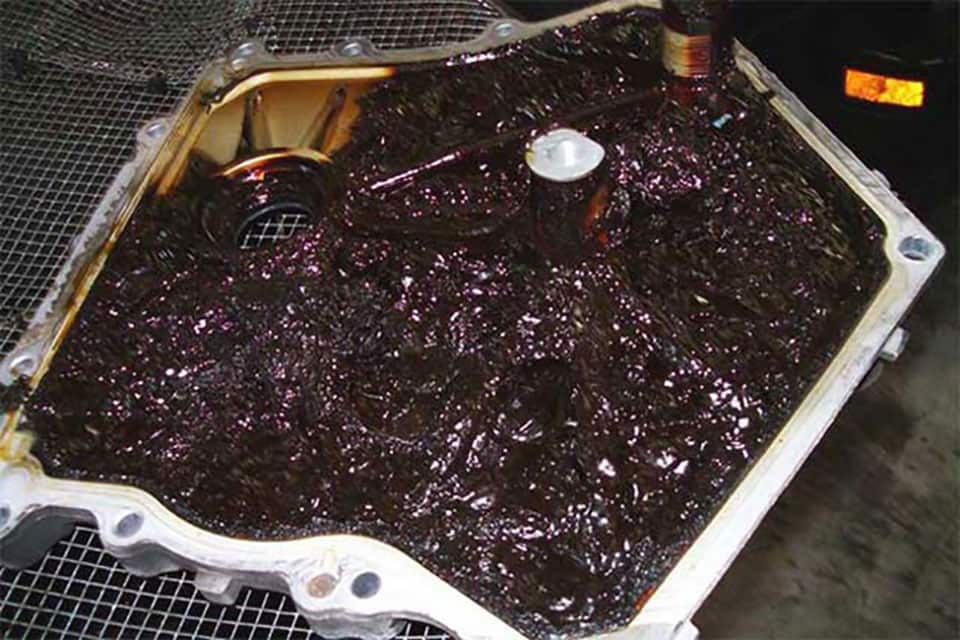Oil Sludge in the 1.8L Turbo Engine
- VW's 1.8-liter turbocharged engine has a tiny oil capacity that often results in sludge.
- Oil sludge is a thick stew of oil and contaminates that increases fricition and heat in the engine.
- The automaker reluctantly reached a settlement for some owners with sludge concerns in 2010.

Sludge is the thickening of engine oil. It's caused by moisture, heat, and other contaminants that break the oil down, causing it to gel and reducing its flow and lubrication qualities.
1.8L Turbocharged Engine Sludge ∞
From 1997-2005, VW manufactured a 1.8-liter turbocharged engine with a tiny 3.7-quart oil capacity.
Turbochargers are hot. Combine that with an undersized oil supply to dissipate the heat, and you have trouble on your hands. Mechanics have said the 1.8-liter engine's oil capacity essentially removes any margin of error for owners who are a little late on an oil change, or those that mostly do short-trip driving.
It's worth noting that VW did install "oil coolers" in these engines to help with the problem. However, most owners say they didn't do much (other than leak). And, yes — there are certain oils that can handle engine heat better, but they’re more expensive and owners are often not informed that they need it.
VW's Extended Warranty ∞
Volkswagen acknowledged the sludge problem in 2004 when they extended the warranty on some cars to 8 years / unlimited mileage. They promised to help customers who had already paid for repairs, but only if they could provide documentation showing adequate maintenance records.
It sounded great, but owners quickly found out that by adequate, VW actually meant perfect maintenance records.
- Accidentally throw out one of your oil receipts? Denied!
- Decide to change your own oil to save a few bucks? No warranty for you!
- Miss a recommended oil change by a few miles? Stinks to be you.
Class-Action Lawsuit and Settlement ∞
Complaints poured in to the Center for Auto Safety about VW's ridiculous restrictions and their continued denial of claims. Owners were left with expensive repair bills running anywhere between $4000 and $8000.
Eventually, lawsuits were filed against VW claiming that 500,000 of the automaker's vehicles were prone to sludge-damaged engines. They also said that VW committed fraud by telling owners it was their fault for not changing the oil enough.
In a 2005 interview with The Plain Dealer of Cleveland, Len Hunt — who was then vice president of VW — said he thought the requirements for consumers to get reimbursed were too strict.
“When you’ve got a reputation for not such stellar quality, you’ve to treat the customer properly. Sometimes your rules and regulations and the culture of the company can be a little harsh when it gets translated down to the customer level,” he said. “We’ve got to have some latitude in there.”
VW eventually eased the restrictions on sludge claims and reached a settlement agreement on their lawsuits. They denied any wrongdoing in the process.
Settlement Provisions ∞
- Owners will be compensated 100% of the repair costs if they can prove they performed the last two oil changes within the recommended specs before any oil sludge or engine failure started. There is a 20% "permissible variance" on those time and mileage limits.
- Owners will receive 50% of the repair costs if they cannot provide proof that the last two oil changes were made within the recommended specs before the oil sludge or engine failure happened.
What Owners Say About This Problem
My car was driving perfect, no problems at all. Then all of a suden my car starts making this weird noise, then its dead? My car was in great condition, cosmetically and mechanically. Beautiful car, my first VW and i love it ... Then i looked online and found out why, i want justice!
My 2003 VW Passat has an oil sludge problem. The engine died on the freeway in very heavy traffic and would not restart. Have been told I need a new engine. The dealer told me the 'sludge warranty' (I didn't even know there was one and did not know about oil sludge) was for eight years. I have owned my car for 8 years and 3 months.